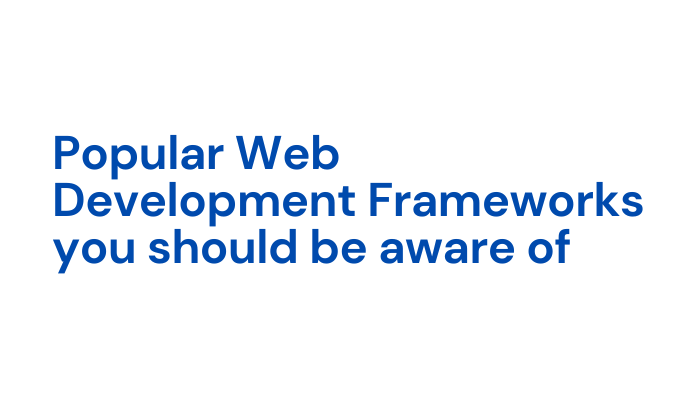Popular Web Development Frameworks you should be aware of
 Austin David
Austin David
Web development is a constantly evolving field, with new frameworks and libraries popping up every year. With so many options available, it can be overwhelming to choose which framework to use for your next project. In this blog, we’ll discuss some of the most popular web development frameworks that you should be aware of, their features, and their use cases.
React
React is a popular JavaScript library for building user interfaces. It is maintained by Facebook and is widely used in web development. React allows developers to create reusable UI components and efficiently render them to the web page. It also provides a virtual DOM, which updates only the necessary parts of the UI when changes occur, improving performance. React is ideal for building single-page applications (SPAs) and is widely used in the front-end development of web applications.
How to Learn:
Angular
Angular is a popular framework for building web applications. It is developed and maintained by Google and provides a comprehensive set of features for building complex applications. Angular uses TypeScript, a superset of JavaScript, which makes the code more scalable and maintainable. It also provides a built-in component-based architecture that allows for reusable code and easy maintenance. Angular is ideal for building large-scale, enterprise-level applications.
How to Learn:
Vue
Vue is a progressive JavaScript framework for building user interfaces. It is lightweight and easy to learn, making it a popular choice for developers new to front-end development. Vue provides a reactive and component-based architecture, which allows for easy code reuse and maintenance. It also has a great ecosystem of plugins and libraries that make it easy to extend its functionality. Vue is ideal for building small to medium-sized applications.
Django
Django is a high-level Python web framework that follows the model-view-controller (MVC) architectural pattern. It provides a comprehensive set of features for building web applications, including an object-relational mapper (ORM), authentication, and an admin interface. Django also follows the Don’t Repeat Yourself (DRY) principle, which reduces code duplication and makes maintenance easier. Django is ideal for building large-scale, database-driven web applications.
How to Learn:
Ruby on Rails
Ruby on Rails, commonly known as Rails, is a popular web development framework written in the Ruby programming language. It follows the convention over configuration (CoC) principle, which reduces the amount of boilerplate code needed to build web applications. Rails provide a comprehensive set of features for building web applications, including an ORM, MVC architecture, and automatic generation of RESTful APIs. Ruby on Rails is ideal for building fast, database-driven web applications.
Express
Express is a popular JavaScript web framework for building server-side applications. It is lightweight and flexible, making it a popular choice for building RESTful APIs and microservices. Express provides a simple, minimalist approach to building web applications, which makes it easy to learn and use. It also has a great ecosystem of plugins and libraries that make it easy to extend its functionality. Express is ideal for building small to medium-sized applications that require a lightweight, scalable server.
ASP.NET
ASP.NET is a popular web development framework developed by Microsoft for building dynamic web applications. It provides a comprehensive set of features for building web applications, including an MVC architecture, an ORM, and built-in authentication and authorization. ASP.NET also provides a flexible and modular architecture, making it easy to extend and customize its functionality. It also supports multiple programming languages, including C#, Visual Basic, and F#. ASP.NET is ideal for building large-scale, enterprise-level applications, and is widely used in the development of e-commerce and content management systems.
How to Learn:
.NET Course Online
In conclusion, these are some of the most popular web development frameworks that you should be aware of. Each framework has its own set of features and use cases, so it’s important to choose the one that best fits your needs. Whether you’re building a small, single-page application or a large, enterprise-level application, there is a framework out there that can help you achieve your goals.
Subscribe to my newsletter
Read articles from Austin David directly inside your inbox. Subscribe to the newsletter, and don't miss out.
Written by

Austin David
Austin David
An IT Enthusiast who likes to share his knowledge and latest updates about IT Industry